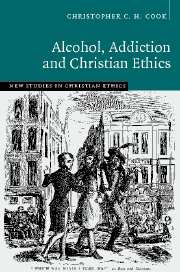Book contents
- Frontmatter
- Contents
- General editor's preface
- Preface
- 1 Alcohol, addiction and Christian ethics: introduction
- 2 An addiction in context: the use, misuse and harmful use of alcohol
- 3 Drunkenness as vice in the New Testament
- 4 Drunkenness as intemperance: Augustine, Aquinas, Luther and Whitefield
- 5 Temperance redefined: the nineteenth-century temperance movement
- 6 Addiction as sin and syndrome: the divided self
- 7 Alcohol, addiction and Christian ethics
- 8 Conclusions
- Bibliography
- Index of Bible references
- Index of names and subjects
General editor's preface
Published online by Cambridge University Press: 22 September 2009
- Frontmatter
- Contents
- General editor's preface
- Preface
- 1 Alcohol, addiction and Christian ethics: introduction
- 2 An addiction in context: the use, misuse and harmful use of alcohol
- 3 Drunkenness as vice in the New Testament
- 4 Drunkenness as intemperance: Augustine, Aquinas, Luther and Whitefield
- 5 Temperance redefined: the nineteenth-century temperance movement
- 6 Addiction as sin and syndrome: the divided self
- 7 Alcohol, addiction and Christian ethics
- 8 Conclusions
- Bibliography
- Index of Bible references
- Index of names and subjects
Summary
This book is the twenty-seventh in the series New Studies in Christian Ethics. It is also the third in succession on a medically related issue – a subject largely unexplored in earlier books in the series. The twenty-fifth book was Celia Deane-Drummond's Genetics and Christian Ethics, and the twenty-sixth was my own Health Care and Christian Ethics. As a qualified doctor, psychiatrist and now Anglican priest, Christopher Cook has the added advantage of both clinical and pastoral experience in this area. It makes him particularly well qualified to fulfil the two key aims of the series as a whole – namely, to promote monographs in Christian ethics which engage centrally with the present secular moral debate at the highest possible intellectual level and, secondly, to encourage contributors to demonstrate that Christian ethics can make a distinctive contribution to this debate.
Christopher Cook's clinical work in the area of alcohol dependence has convinced him that there is a gap in much secular discussion. While he is critical of simplistic moralistic approaches to alcoholism (especially the nineteenth-century Christian Temperance Movement) and is deeply informed by modern biosocial studies, he argues that a careful use of Paul's and Augustine's notion of the divided self can still make a significant contribution today. The latter can suggest an important link between our experience of ourselves and that of those with a medical disorder of severe alcohol dependence.
- Type
- Chapter
- Information
- Alcohol, Addiction and Christian Ethics , pp. ix - xPublisher: Cambridge University PressPrint publication year: 2006



